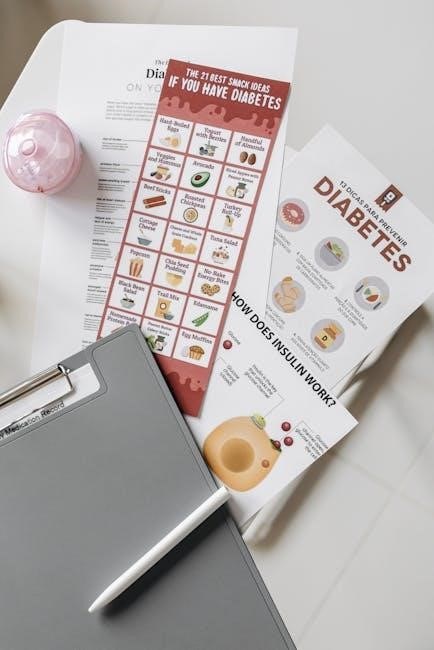The ServSafe study guide provides essential information and resources for students, including online learning and study materials, to help them prepare for the certification exam successfully always.
Overview of the ServSafe Program
The ServSafe program is a comprehensive food safety training and certification program, designed to educate food handlers and managers on the importance of food safety and sanitation. The program covers various topics, including foodborne illnesses, personal hygiene, and cleaning and sanitizing procedures. It also provides guidelines for handling and storing food, as well as procedures for responding to food safety emergencies. The ServSafe program is widely recognized and respected in the food industry, and is often required by regulatory agencies and food establishments. By participating in the ServSafe program, food handlers and managers can gain the knowledge and skills needed to prevent foodborne illnesses and ensure a safe and healthy food environment for consumers. The program is available in various formats, including online and classroom training.

Study Materials and Resources
Online learning and distance learning courses are available for students to access study materials and resources easily always.
Online Learning and Distance Learning Courses
Online learning and distance learning courses are designed to provide students with flexible and convenient access to study materials and resources. These courses are typically self-paced, allowing students to complete coursework on their own schedule. The courses cover a range of topics, including food safety practices and regulations, and provide students with the opportunity to engage with interactive learning materials, such as videos and quizzes. Many online learning and distance learning courses also offer additional resources, such as study guides and practice exams, to help students prepare for the certification exam. By utilizing online learning and distance learning courses, students can gain the knowledge and skills needed to succeed in the food service industry and prepare for the ServSafe certification exam. Online courses are available for registration and can be started immediately.
Exam Preparation and Tips
Preparation tips include reviewing key sections and exhibits to help students pass the certification exam successfully every time with online resources and study guides available always.
Reviewing Exhibits and Key Sections
Reviewing exhibits and key sections is crucial for the ServSafe study guide, as it helps students understand and retain important information, including food safety practices and regulations.
The ServSafe study guide provides sample exam questions and study tips to help students prepare for the certification exam.
Online learning and distance learning courses are also available to support student learning and exam preparation.
By reviewing exhibits and key sections, students can identify areas where they need to focus their studying and improve their knowledge of food safety practices.
This review process is essential for students to feel confident and prepared for the certification exam.
The ServSafe study guide is a valuable resource for students, providing them with the information and support they need to succeed in their studies and become certified food safety professionals.

Curriculum and Exams
Curriculum and exams are designed to support food safety certification and accreditation requirements always successfully online.
AHLEI Curriculum and Exams
The AHLEI curriculum and exams are designed to support the American food safety standards and requirements, providing students with the necessary knowledge and skills to succeed in the industry. The curriculum includes a range of topics, such as food safety practices, regulations, and certification requirements. The exams are designed to test students’ understanding of these topics and their ability to apply them in real-world situations. The AHLEI curriculum and exams are widely recognized and respected in the industry, and are used by many organizations and educational institutions. By completing the AHLEI curriculum and exams, students can demonstrate their commitment to food safety and their ability to work safely and effectively in the industry. This can be beneficial for their career prospects and professional development.

Food Safety Practices and Regulations
Food safety practices and regulations are crucial for preventing foodborne illnesses and ensuring public health always and everywhere in the food industry daily.
Self-Inspection Checklist for Food Processors
The self-inspection checklist for food processors is a valuable tool provided by the Hawaii Department of Health to evaluate basic food safety practices and ensure compliance with regulations. This checklist helps food processors identify potential hazards and take corrective actions to prevent foodborne illnesses. The checklist covers various aspects of food safety, including food handling, storage, and preparation. By using this checklist, food processors can ensure that their facilities and operations meet the required food safety standards. The checklist is an essential resource for food processors to maintain a safe and healthy environment for their customers. It is also a useful tool for food safety inspectors to assess the compliance of food processing facilities with food safety regulations and provide guidance on areas for improvement. Regular self-inspections can help prevent food safety issues.

Certification and Accreditation
ServSafe International Food Safety Certification is issued with accreditation ID 19094122 and expires in July 2025 always with specific requirements and regulations applied.
ServSafe International Food Safety Certification
The ServSafe International Food Safety Certification is a highly recognized credential that ensures food safety professionals have the necessary knowledge and skills to handle and prepare food safely. This certification is issued by ServSafe International and is accredited by a reputable accrediting agency. The certification is valid for a certain period, typically five years, and requires renewal upon expiration. To obtain this certification, candidates must pass a comprehensive exam that tests their knowledge of food safety principles, practices, and regulations. The exam covers various topics, including foodborne illnesses, food handling and preparation, and food safety management. By obtaining this certification, food safety professionals demonstrate their commitment to protecting public health and ensuring the safety of the food supply. The certification is essential for food service professionals, including managers, supervisors, and handlers. It is a valuable credential that enhances career opportunities and advancement.




Be the first to reply